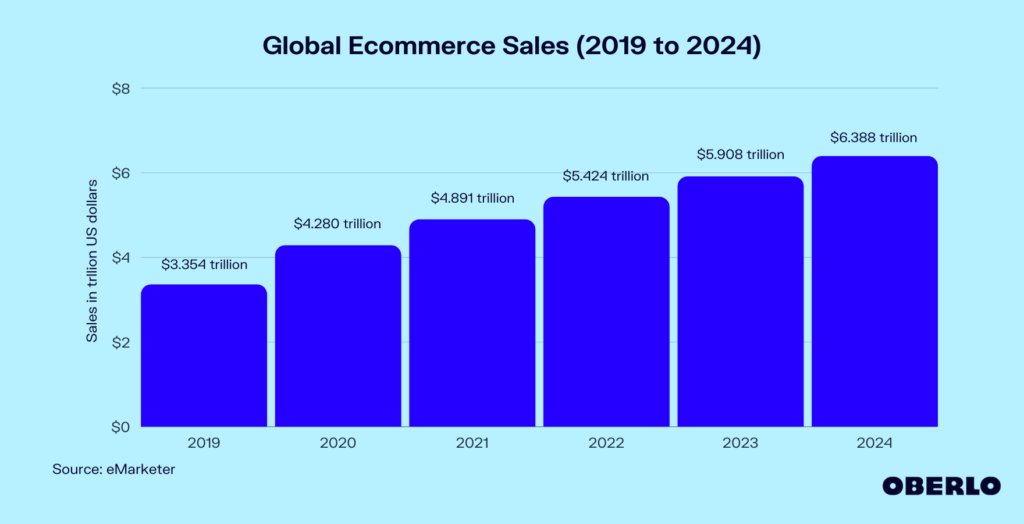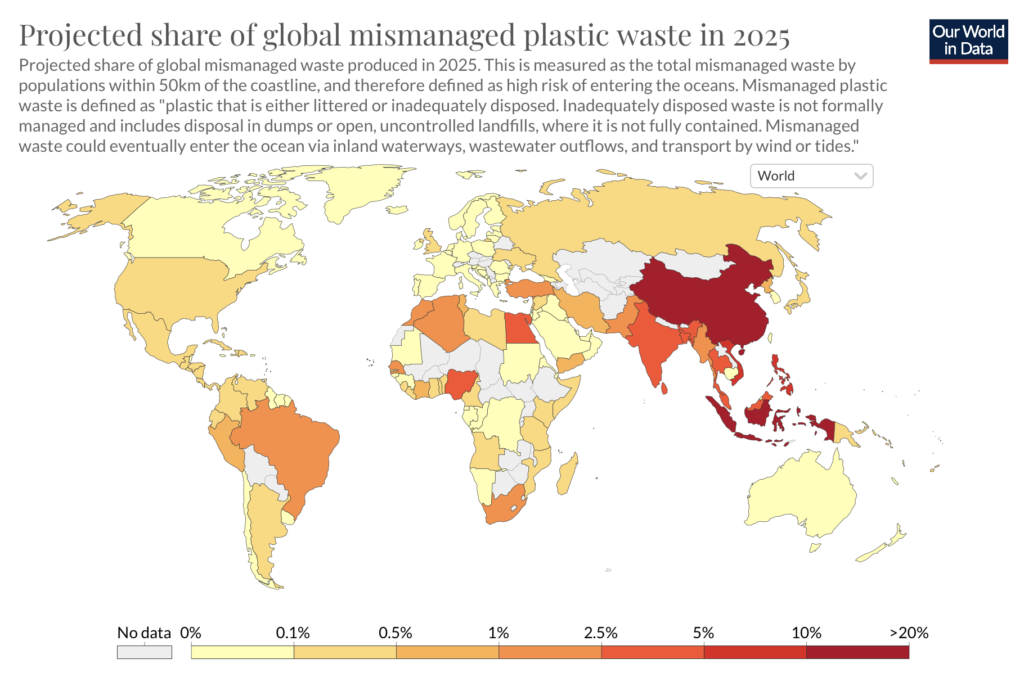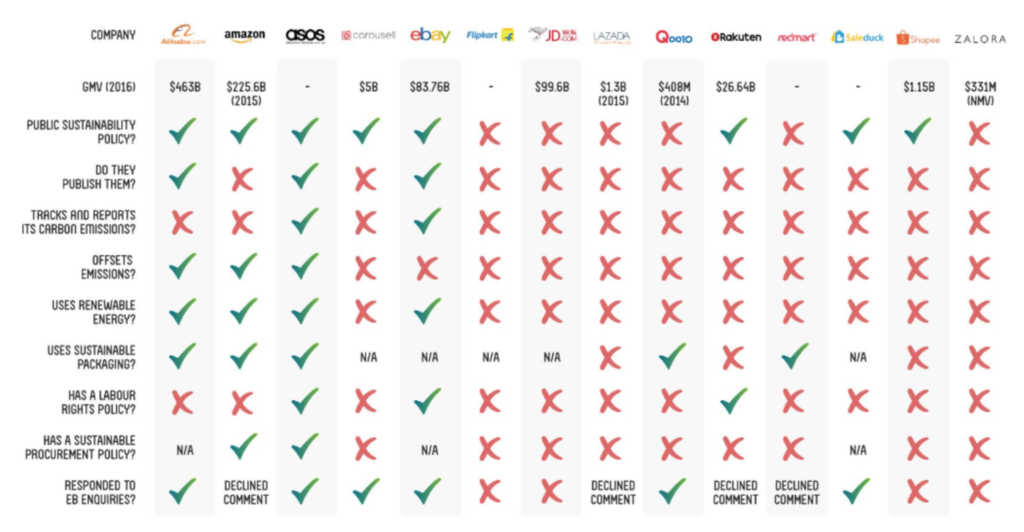95% of all purchases are predicted to be transacted through e-commerce by 2040. Let that sink in. Although this is just a prediction by a Nasdaq study, the numbers are convincing enough to show the significant growth in e-commerce retail over the future, as global sales will jump from 4.28 trillion USD in 2020 to 5.4 trillion USD in 2022.

(Image Source: eMarketer)
But as more people get their new trendy gadgets delivered to their front door, we shouldn’t ignore the environmental consequences that come with it. As a result of the pandemic, paper and cardboard waste increased by 13% to 1.14 million tonnes in Singapore households during the circuit breaker in 2020.
In addition, according to Greenpeace, packaging waste is expected to increase by 300% due to the pandemic’s lockdown measures which will cause more consumption of single-use plastics.
The Big Picture
Based on the report from Our World in Data, packaging is the main source of plastic waste, and the rise of e-commerce has not mitigated the situation at all. China is projected to account for 26% of the world’s mismanaged plastic waste by 2025, maintaining the country’s #1 ranking for plastic pollution. Southeast Asia pulls up second, with Indonesia accounting for about 10% of polluted plastic waste. The infographic below shows the severity of China’s and Southeast Asia’s waste mismanagement compared to the rest of the world.

Image source: Our World in Data
The EU has been making drastic efforts and claims to do their part, aiming to recycle 50% of all plastics by 2025. The EU Plastics Strategy has also cracked down hard on producers, creating laws that hold a firm completely responsible for any plastics it brings into the market – meaning they have to deal with the collection and recycling of its products. With more government incentives and greater pressure from sustainability goals, countries such as the UK have their royal mail parcel service committing to having an all-electric van fleet. Amazon, which has the largest e-commerce presence in Europe, launched the ‘Frustration Free’ Packaging Program to minimise packaging and remove single-use packaging. Although Europe and the rest of the world are still far from achieving their environmental goals, there are hopeful signs that we are headed in the right direction.
How is Singapore doing?
Just a few days ago, I ordered a new keyboard to improve my typing experience at home. It was purchased on Lazada, which ranks #2 in Singapore’s top e-commerce sites. I waited eagerly for my budget Chinese-made mechanical keyboard, checking in each day on the app to track its journey to Singapore. By the time it arrived, I wasted no time indulging in my new gadget.
However, when I was opening the package, I was slightly disturbed by the amount of single-use plastic packaging that was used. The first layer was a grey plastic with lots of unnecessary tape on it, making it hard to cut open. The second was two layers of bubble wrap. And the third, another translucent single-use plastic. Only by then, the keyboard’s original box packaging was revealed. I was baffled by the redundant use of bubble wraps and plastic to protect something that was already well covered by the original cardboard boxing. Why couldn’t it just be put in one single layer of cardboard for packaging? Or even better, tightly wrapped with paper packaging? Part of me felt guilty, but the other part wanted to find out why this was the case, and if all packaging from Lazada was sent this way too.
A simple google search of ‘Lazada sustainable packaging’ yields no articles or insights about efforts made to reduce wasteful packaging. One of the first few results are listings on Lazada selling ‘eco-friendly packaging’. How ironic is that?
Looking at a few more results down the page, we get signable petition pages that are pleading for Lazada and Shopee to rethink their packaging processes. There are articles focusing on certain eco-groups coming together to stop these SEA e-commerce giants from continuing their unsustainable packaging. Furthermore, Eco-Business has studies that shed light on some of their findings:
“A 2018 Eco-Business study of the e-commerce sector highlighted that Lazada does not have a sustainability policy. Its sustainability efforts have focused on economic inclusion, supporting small-to-medium sized businesses and entrepreneurs.”
Here’s an interesting graphic from the same study:

Image source: Eco-Business
Recent Efforts
However, more recent efforts from Lazada have outdated the 2018 study above. Janet Neo, who leads corporate sustainability for the group, has claimed that Lazada has placed measures to reduce plastic packaging material in 2020’s 12.12 shopping campaign. This led to a 65% reduction in plastic packaging materials compared to before.
On Earth Day in April, Lazada hosted a conference for ‘Shaping Sustainable eCommerce in Southeast Asia’, with one of the five main talking points being sustainable logistics and packaging.
These talking points should be more recognized by media outlets or branded further by the company to get the stance of being environmentally friendly out there. If the word gets out that good deeds are being done, company reputations will improve and consumers will soon question their plastic consuming habits as well. However, being more responsible doesn’t just stop there.
Why Plastic Packaging Is Still a Problem
Despite being Singapore’s largest e-commerce companies, Lazada and Shopee are only just platforms for sellers to get to their customers. Convenient and algorithmically smart, these platforms create eye-catching interfaces for consumers and manage payments intelligently. But they’re not in charge of the production and packaging of these products as the partners responsible are mainly based overseas in China. Lazada and Shopee aren’t in charge of the delivery, as it’s usually passed on to partners such as NinjaVan or GoGoX. Hence, these e-commerce companies don’t have a grip on what type of packaging their consumers are going to get. It’s hard for these companies to take control of roles such as packaging and distributing since they do not enjoy the large scales that Amazon has to control their packing methods.
But at the same time, e-commerce companies in Singapore need to be more open about this – sustainability innovation teams need to open up about these issues to the public, rather than just focus on being economically inclusive to small sellers. E-commerce companies can also do their part by promoting sustainable brands on their sites, and incentivizing sellers to cooperate with eco-friendly packaging.
The Right But Long Path
It’s mainly up to whether e-commerce companies and their partners want to create sustainable solutions to their business since no one can stop the ever-growing tide of online consumption. A study by NielsenIQ done in 2015 found that 66% of people are willing to spend more on eco and socially responsible products. By promoting sellers that ensure efficient packaging, consumers may find themselves doing their part by purchasing from specified sellers. This could be a temporary solution until e-commerce giants in Southeast Asia can start enforcing their own packaging solutions.
RedMart, a popular e-commerce grocery company in Singapore that is now acquired by Lazada, handles delivery with its own fleet. When ordering groceries online, customers have the option to choose a ‘Go Green’ delivery method that takes slightly longer than normal. This allows RedMart to optimize its delivery, ensuring that each van is full before it departs for delivery. RedMart has also taken steps to start using biodegradable plastic bags.
Despite some efforts to push for a greener future, Singapore still needs to overcome an invisible barrier – for people and companies to not be afraid of criticism and open up to these pressing issues.








